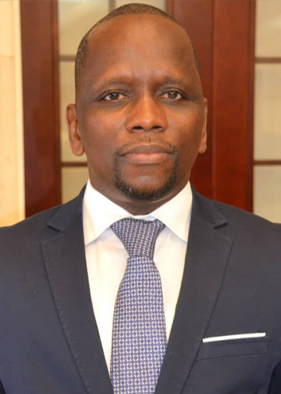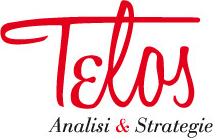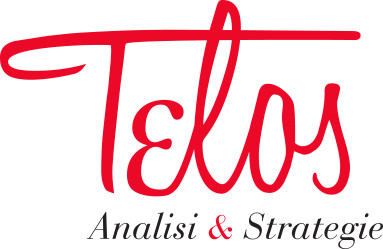October 2022, Year XIV, no. 10
Dionísio Cumbà
Minister, on One Condition…
“That very night, I got yet another call from Prime Minister Nabiam, and I told him my one, but very important condition for accepting the appointment as Minister: being able to continue to work as a paediatric surgeon. Unfortunately, in my country, there’s no other figure with my training, and I couldn’t abandon the children”.
Telos: How did you become the Minister of Health of Guinea-Bissau?
Dionísio Cumbà: Accepting the appointment as the Minister of Health in my Country wasn’t an easy decision. I am the only paediatric surgeon in Guinea-Bissau and I have always preferred to focus on helping children rather than on politics, even healthcare policy.
They convinced me after the third attempt. I’ll tell you briefly what happened. In 2021, after working for 11 continuous years as a paediatric surgeon in the St. Josè em Bor hospital, I returned to Italy with the intention of staying with my family for about two years. On 15 April I signed a contract to work with the Bergamo Hospital and on Sunday evening, 18 April, I got a call from the Prime Minister of my country proposing that I lead the Ministry.
My initial reaction was an immediate “no, thanks.” But Nuno Nabiam kept me on the phone for over 30 minutes. He didn’t give up easily. The next day, clearly at his behest, I got calls from the Minister of Transport and the Undersecretary of Security, both prominent members of his party, the National People’s Assembly. They were long, complex conversations. That very night, I got yet another call from Prime Minister Nabiam, and I told him my one, but very important condition for accepting the appointment as Minister: being able to continue to work as a paediatric surgeon.
Unfortunately, in my Country, there’s no other figure with my training and I couldn’t abandon the children. My condition was willingly accepted and Nabian added that I would get all the support possible to improve the healthcare system of Guinea-Bissau. He left me no choice so on 3 May, I was sworn in before the President of the Republic, Umaro Sissoco Embaló.
When you were appointed in 2021, what was the state of the healthcare system and how do you intend to reform it?
Let’s take a step back. I had just completed my specialisation in paediatric surgery in Italy and had returned to my village, Jugudul, 55 km from the capital, for a few days. My near future was already decided: just a brief stop in Italy, then I would be off to London, where a rather important job was waiting for me. I was just about to leave when one of my paediatric colleagues from Bissau told me about a 15-day-old baby girl who had just been brought to the hospital with a distended abdomen and a suspected intestinal block. I left the village, got to the hospital, examined the baby girl and understood that she needed an urgent colostomy. Not only was there no surgeon who would do this operation – my colleague confessed that children with this diagnosis usually worsened until they died - there wasn’t even a paediatric anaesthesiologist, nor was there an operating room equipped to operate a such a small baby. So, we went all over the city in a taxi – there were no ambulances in the country – with that little girl in my arms and we visited two hospitals where there weren’t even the basic conditions to do surgery. So we got to a private clinic that had an operating room, even though it hadn’t been used for about six months. There was no electricity or even basic sanitation to operate. It was filthy everywhere. With an oculist friend who was with me on vacation, we decided to try and work around the problem of the electricity by buying some diesel fuel for the generator. We cleaned everything up and brought the baby into the operating room. But that’s not the end of the story. As soon as I made the incision, the generator froze up and we had to do the colostomy using the light on my oculist friend’s mobile phone. Today the girl, whose name is Dionisía, is 12 years old and a student.
Does that give you a good enough idea of the status quo? The fragility of my country’s healthcare system and the chance to do something to improve it were my main reasons for accepting the appointment. Before becoming Minister, I already knew the challenges I would be facing.
I started by deeply reforming the entire healthcare system, with a very well-defined plan that started with training doctors in 16 areas of specialisation. At the same time, we need to think about building new, modern infrastructures. This isn’t so easy in a country with few trained, competent resources in the medical field, where the development of the healthcare sector, despite the assurances I received, still isn’t a priority for the government, in spite of the tough lessons of the Covid-19 pandemic. The last government budget for my Ministry is 10% compared to the 47% of the Ministry of Defence and the Interior. I am really counting on Italy, which I’m sure can give a lot, as it has already done in the past.
Your relationship with Italy, and with Padua in particular, goes way back. Could you tell us your story starting with when you left Jugudul?
Besides my family – my wife is Italian and we have two children - Italy and Padua in particular have taught me a lot about medicine, and I try to spread this knowledge throughout Guinea-Bissau. My story is full of coincidences. I’m just going to give you the highlights. When I got to Bissau and they made me take an admission test for secondary school. I passed it, but I didn’thave a place to live. An acquaintance helped me out and took me to meet one of the most important figures in my future life: Father Battisti. The Italian missionary runs a residence for young students without a place to live, and I remained under his wing until I had finished secondary school. Always thanks to Father Battisti, and the support of the Italian parishes, in 1991 two other guys and I got to the town of Montecchio Maggiore, in the province of Vicenza, Veneto, with the intention of studying Medicine.
Economic problems forced me to change plans and I decided to go to Nursing School in Verona. In 1994 I got my degree in nursing. After various other vicissitudes, and a few years later, I managed to enrol in the Pharmaceutical Chemistry faculty in my beloved Padua. To support myself, I started working for a cooperative with a contract with the Dolo hospital, a small town outside Venice. It was there that I met my new Veneto family: the doorman of the hospital where I was working took a liking to me and gave me his son’s moped to help me get around. I didn’t know it then, but that was just the beginning. A while later, one Sunday he invited me to Arino, a small village near Dolo, to introduce me to some of his friends. There were 40 families sitting around a table and they announced that they wanted to fund me to help me go to medical school, in strict Venetian dialect.This was the biggest turning point in my life. When I got back to Guinea-Bissau, I built a children’s hospital with Father Battisti in Sao Josè em Bor, with the backing of some industrialists from Brescia.
Since then, lots of medical missions have been organised, starting with the ones carried out thanks to my professor from my specialisation in Padua. From Brescia, Foggia, Ferrara and Sicily with a group of anaesthesiologists.The missions in paediatric surgery with Prof. Gamba, neurosurgery with Prof. Fagin, and the anaesthesiologists Dr. Tognon and Dr. Vogaro have been going on for 10 years. Then German and Portuguese groups have also come, which puts us at 10,000 surgical operations. Italy holds a deep place in my heart.
Not only has your relationship with our country never been interrupted, it continues today. In the last months, you returned for an institutional mission that was crucial to revive bilateral relations with Italy, and this mission even brought you to Rome. Will you tell us about it?
Just to reiterate: I’m really counting on the possibility of developing bilateral government relations with Italy. Italy has always been close to Guinea-Bissau through relations with the UN, the EU and the Church. At a diplomatic level there is only one honorary consulate in Bissau. I have been trying to foster communication between the two countries for a year in order to prepare for the visit of my Prime Minister to Italy and lay the groundwork for a bilateral agreement to further cooperation projects in the three sectors I think are strategic to the growth of Guinea-Bissau: healthcare, agriculture and tourism, all sectors where Italy truly has a lot to give. I continue working on this through my contacts in Italy, led by Prof. Michele Karaboue. He is familiar with healthcare conditions in Africa because he is originally from the Ivory Coast. So, following my appointment, he contacted me to show his willingness to help me. We are currently working in the Puglia, Basilicata and Lazio regions to lay the foundations for stronger bilateral relations. Thanks to Karaboue, we signed a cooperation agreement with the University of Foggia for distance learning.
On my last trip to Italy I even travelled to Rome, where I visited the historic Santa Famiglia Clinic, specialised in gynaecology and obstetrics and with a nationally renowned Birthing Centre. I received a warm welcome from the director, Dr. Possemato, and the president of Italian Neonatal Society, Prof. Luigi Orfeo. They are looking forward to working together to train neonatologists and gynaecologists in my Country through exchange programmes. What can I say? We’re just getting started.
Marco Sonsini
Editorial
What do we prefer, good news or bad news? And what about stories with a happy ending, where after various vicissitudes the hero finds love and success. Are they just too old fashioned? Well, the story of this month’s guest for PRIMOPIANOSCALAc isn’t silly or sappy or snooty or celebratory. It’s just beautiful, and we could use more stories like it.
Sure, right now it’s cool to be sceptical, cynical and disenchanted, while showing trust and hope in the future isn’t. But we have decided to go against the grain, and when Dr. Dionísio Cumbà, Minister of Health for the Republic of Guinea-Bissau, agreed to our interview, we were honoured, delighted and even a tad emotional.
First, a little context. The Republic of Guinea-Bissau is one of the smallest states in Africa. It was a Portuguese colony and the people there speak Portuguese creole. However, it proclaimed its independence on 24 September 1973 and its statehood was officially recognised on 10 September 1974. So as not to be confused with former French colony Guinea, which it borders, this Republic decided to add Bissau,the capital city, to its original name.
Cumbà has a very special story. As a boy in an African village, he made a choice that went against all common sense and decided to pursue his dream of becoming a doctor at all costs, only listening to the voice of his father, who used to tell him "You have to keep on studying".
What ensued in the life of Cumbà before he fulfilled his dream was a true odyssey, and he sums it up in just a few lines when he answers our question and talks, very humbly, about happy coincidences. Yes, there must have been a few coincidences, but he makes no mention of his commitment, willpower and tenacity. He barely mentions the eight kilometre walk from his village to school, how he would gather wild fruit to sell by the roadside so he could buy himself a notebook, some short pants, a t-shirt, a pair of shoes. He doesn’t talk about how he had to sell a chicken to pay for the bus ride from his village to Bissau or how he had to sleep on the ground under a street light to arrive on time for the secondary school entrance exam.
Then he never would have got his degree in medicine without the friendship and solidarity of the Dolo families, who mobilised on his behalf. In Veneto, Dionísio even found the love of his life, Laura, a paediatric nurse from Piove di Sacco. He seemed all set for a career in London, but like in all hero tales, there was yet another plot twist waiting around the corner. Before setting off for London, he returned home to bid farewell to his family. Then someone brought him a 15-day-old baby girl whose very survival was hanging in the balance. Cumbà tells us the story of this adventure in our interview to explain why he decided to return to Guinea-Bissau instead of going to London.
There, he is the only paediatric surgeon in the region and, in a very short span of time, he also became the Director of the National Institute of Public Health. Last year he agreed to accept an appointment as the Minister of Health of Guinea-Bissau, but he won’t stop operating, because he knows how much he is needed. We all need men like Cumbà, like a lighthouse in a sea of disenchantment. In fact, this former Portuguese colony –fragile democracy with two thirds of Rome's population and a civil war at its back, where children die of appendicitis – now has a healthcare revolution on the agenda thanks to Cumbà. “We need to work on prevention, reprogramming healthcare with service that is better and capillary, that reaches every last citizen,” says Cumbà.
He adds that he wants to be a bridge with Italy for ever-closer cooperation in healthcare and much more. The infant and newborn death rate is still very high, and Cumbà is there to do something about it!
This month’s cover of PRIMOPIANOSCALAc featuring Dionísio Cumbà is particularly good.
It has the same pop, oneiric look, with the face of our guest and a collage of juxtaposed, unelaborated images that are symbols of his work, role and life arranged around his head like a hat.
In the foreground, we see a character wearing the colours of his Africa, the red, yellow and green of Guinea-Bissau. In the background, there is the licaone, or the African wild dog, a predator that is going extinct and the nickname of the national football club. In the middle are images representing his life adventure: wild fruit, a chicken, a bus, a moped, a little girl as well as the symbols of his profession. In the background, you can see the Padua skyline representing Veneto, his adoptive region.
Mariella Palazzolo

Dionísio Cumbà has been Minister of Health of the Republic of Guinea-Bissau since May 2021. Cumbà was born and raised in Jugudul, a village 50 km from the capital, Bissau. Thanks to the help of a missionary of the Pontifical Institute of Foreign Missions (PIME), Cumbà came to Italy on a scholarship and attended Nursing School in Verona.
He immediately began working as a social-healthcare worker at the hospital in Dolo (VE) since, for inexplicable bureaucratic reasons, he wasn’t allowed to practice as a nurse. Here, thanks to his second father, Rino Stocco, and the support of the local community, he was able to enrol in and attend the faculty of medicine and surgery at the University of Padua and graduated in 2004. In 2010 he specialised at the same University in Paediatric Surgery.
Driven by a desire to “give back to his country what he learned during his years of study in Padua,” after finishing his university studies in 2010, he returned to his country where, along with the missionary he met when he was young, he built a paediatric hospital – the Sao Josè em Bor hospital –with funds raised in Italy. Over the years he has sponsored numerous medical missions from Italy and a total of 10,000 operations, many of which were lifesaving for his patients. He is continuing his career as the Director of the National Institute of Public Health.
Today, although he is very busy in his job as the Minister, he continues to practice his profession. In fact, he is the only paediatric surgeon in the country.
He is founder of the Association TokaToka Africa, which does fundraising for Guinea-Bissau (the funds raised have been used to build schools, wells and so on). When asked what makes him happy, he answered: “people like me who believe it’s possible to create a world where peace is the reality (…).” He is 50 years old and married to Laura. He commutes between Guinea-Bissau and Italy, where he lives in Piove di Sacco, just outside Padua, with his wife, a paediatric nurse he met while he was studying for his specialisation, and their two children, Irene and Marco. He also speaks perfect Venetian dialect!
Marco Sonsini







SocialTelos